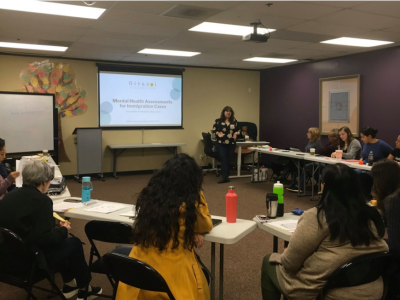AUSTIN, Texas— For individuals navigating the U.S. immigration legal system, there is a major gap in accessible services. Many immigrants are survivors of violence serious enough to flee their home countries and experience mental health impacts from trauma. In most cases, their mental health and trauma histories are not adequately evaluated, considered or represented in the immigration documentation process.
Girasol Texas, a program at the Steve Hicks School of Social Work’s Texas Institute for Child & Family Wellbeing, aims to change this systemic gap through the Mental Health Collaborative. This project trains qualified mental health professionals to use their clinical skills in a new way—to evaluate individuals seeking legal immigration relief and write a letter of support for their case.
This past April, Girasol Texas received an award of $10,020 from the Texas Bar Foundation to fund an expansion of the Mental Health Collaborative. Since its inception in 1965, the Texas Bar Foundation has awarded more than $22 million in grants to law-related programs. Supported by members of the State Bar of Texas, the Texas Bar Foundation is the nation’s largest charitably-funded bar foundation.
The Texas Bar Foundation grant will fund a new partnership with local immigrant-service organization American Gateways. Through this partnership, the Mental Health Collaborative will coordinate evaluations and letters of support for 15 American Gateways clients whose cases would benefit from their services. Girasol Texas will focus on expanding, evaluating, and improving their program methods. The goal is a coordination system that is effective, replicable at different organizations, and scalable to serve more clients.
When a person is in the midst of violence, they are rarely positioned to collect the evidence that courts look for in their decision to grant documentation. These missing pieces can negatively impact the outcome of immigration cases. Survivors of violence may be denied asylum or left waiting in a detention center for years.
“Therapists can be trained to help assess and explain mental health challenges and trauma. This can become a critical piece of evidence that helps the courts understand what an immigrant has been through,” founder and program coordinator of Girasol Texas Ana Hernández said.
Mental health evaluators can make critical contributions to legal cases, but because there is no coordinated systems-level approach to integrating legal and mental health services, it is often costly and inaccessible for immigrants to have a mental health evaluator work on their case. Since it started in 2019, Girasol Texas has trained over one hundred mental health professionals in Texas and began coordinating the first 40 cases.
Although the results of immigration cases can be difficult to track, Girasol Texas’ preliminary data shows that the Mental Health Collaborative’s model can successfully aid legal teams in obtaining legal relief for clients. In a case this year, a woman who fled persecution and abuse in Angola and then faced further oppression during migration, was detained in the United States. After Girasol Texas coordinated the evaluation and letter of support, she was released from detention and connected with a local community-based shelter. The letter this woman received from the Mental Health Collaborative can also strengthen her future asylum case.
Hernández says that Girasol Texas’ virtual trainings have begun drawing mental health professionals from around the country. Eventually, Hernández would like to expand the Mental Health Collaborative into a nationwide initiative—a network of professionals around the United States who prioritize the wellbeing of immigrant communities.
—
Media contact:
Kate McKerlie
Communications Director
Girasol Texas | Texas Institute for Child and Family Wellbeing
Steve Hicks School of Social Work | The University of Texas at Austin
katelynmckerlie@austin.utexas.edu
(512)-232-0648


